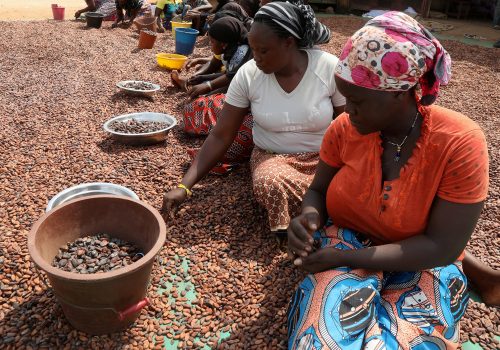Critical connectivity: Reducing the price of data in African markets
This report is part of an ongoing partnership on the Power of African Creative Industries between The Policy Center for the New South (PCNS) and the Atlantic Council’s Africa Center.
“Critical connectivity: Reducing the price of data in African markets,” by Africa Center Senior Fellow Aubrey Hruby, analyzes the current state of the digital transformation in Africa and outlines how affordable and accessible data is imperative for further development. Finally, it provides concrete recommendations to the key actors and facilitators of the transition outlined in the Digital Transformation with Africa; a new initiative the Biden administration announced at the 2022 US-Africa Leaders Summit, which emphasizes the importance of reducing data costs in Africa to spur growth and employment.
In outlining why data remains so costly and inaccessible across Africa, Hruby profiles four main detriments: infrastructure, competition, policy, and consumption patterns. Through case studies and success stories from other developing nations who struggled with high-priced data and implemented successful mitigation measures, Hruby develops a framework for reform and showcases how key changes can rapidly reduce data costs, spur development, and transform entire industries. Her recommendations directly address the current US administration, African governments seeking to build and benefit from a digital economy, and global development finance institutions (DFIs) that are already investing and making much needed transformative inroads into African markets.
Throughout the 21st century, African markets have unleashed the globe’s most significant digital revolution, and they are poised to continue doing so over the next few decades as the world’s youngest population reaches maturity. Currently, 40 percent of the continent’s total population is under the age of 15 and represents 27 percent of the entire world population. From 2000 to 2010, the African mobile phone market grew at a rate of 44 percent per year, bringing the number of subscriptions to around 700 million, more than in both the European Union and the United States combined. For African creative and mobile industries, which are emerging at the forefront of this digital revolution, infrastructure and technological systems are critical to the sector’s continued growth. The African Continental Free Trade Area connects 1.3 billion people across fifty-five countries with a combined GDP of over $3 trillion. Digital infrastructure is a vital economic opportunity and a crucial security issue for African nations and their partners.
The African vision is increasingly shaped by the digital tools and platforms African consumers use and the new opportunities that have emerged in a growing start-up ecosystem. According to the UN, the digital economy is set to expand in Africa by 57 percent between 2020 and 2025. With projections by the Alliance for Affordable Internet forecasting that the continent’s digital economy will grow six times over by 2050 to $712 billion and the fact that African startups raised more than $4 billion in venture capital in 2021, it is clear that this sector is booming. Undoubtedly the future is digital, and Africa must be able to access this future affordably if it is to share in the benefits of this global revolution.
The Atlantic Council is the only DC global think tank to have placed African creative industries at the center of its security and prosperity work. The Africa Center’s focus on the creative industries was launched by the Africa Creative Industries Summit of Washington in October 2021 at the Smithsonian National Museum of African Art and was opened by a message from Vice President Kamala Harris. The program is now fully supported by strong sponsors and partners, from ADS Group and Afreximbank to OSF and OCP, allowing the Atlantic Council to continue its leadership in the field by hosting events such as the Sports Business Forum, held in Dakar, and the financial engineering task force for African creative industries. This work was crowned by the Africa Center’s partnership with the US Department of State and its participation in the organization of the African and Young Leaders Diaspora Forum on the first official day of the US-Africa Leaders Summit of December 2022 at the African American Museum of History and Culture in Washington.
Report author

The Africa Center works to promote dynamic geopolitical partnerships with African states and to redirect US and European policy priorities toward strengthening security and bolstering economic growth and prosperity on the continent.
Related content
Image: A Somali Optical Networks (SOON) technician checks a satellite dish at their headquarters in Mogadishu Somalia, July 12, 2017. Picture taken July 12, 2017. REUTERS/Feisal Omar




Follow the conversation on Twitter with @ACAfricaCenter and @AtlanticCouncil